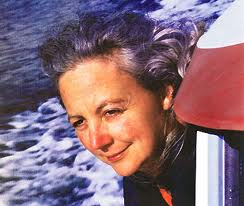by Chelsea Thornton (Staff Writer)
The political message in the documentary Alexandra’s Echo is clear: industrial open-net fish farming is hurting the wild salmon population of the Broughton Archipelago, which in turn hurts the entire area’s aquatic and terrestrial ecosystems. Written and directed by Helen Slinger, the documentary is definitely about more than salmon. Slinger uses a mosaic effect, combining modern footage with old film and photos, mixing solid science with emotion, to illuminate not only an environmental saga, but also a picture of life in a small B.C. coastal community, as well as the story of Alexandra Morton, the biologist and whistle-blower at the centre of the aquaculture debate. Morton’s story is presented along three lines — she appears first as a passionate biologist studying killer whales in B.C., then as a family woman, and finally as an activist against aquaculture. Morton’s three roles are woven together, so that we understand that her activism is deeply routed in her love of whales and their home, and in her matriarchal desire to preserve the local environment.
The strength of the film arises from its careful balance of sentimentality and science. Morton is compelling both as a woman, and as a biologist. Slinger wisely uses Morton’s love life and family life to help make the science in the film more persuasive: Morton’s personal life makes the viewer more emotionally susceptible to the scientific message of the film. Slinger emphasizes the importance of the landscape in Morton’s life, populating it with her children, her husbands, and her ever-present dogs, so that, when the film calls on the viewer to oppose aquaculture in a effort to save the landscape, the viewer feels that it is an appeal for more than a piece of land and water, but also an appeal for a home, not just of Morton, but of the many locals who appear in the film.
If you prefer to have your warm and fuzzy side left alone by documentaries, and prefer to focus on the cold, hard facts, Alexandra’s Echo has you covered as well. Although interspersed with the aforementioned “sappy” moments, the film relies on Morton’s biological research for the meat of its argument. The film examines her various smolt-studies, spanning several years, as well as similar studies done at the international level. Morton is a university-trained biologist, and the studies included in the film are published in several peer-reviewed scientific journals.
Whether you want to have your heartstrings tugged or your brain cells stimulated, Alexandra’s Echo is a powerful and accessible documentary for any audience. And, with the Broughton Archipelago only a short ways up the coast, and fish farms in the waters just outside of Vancouver, this documentary hits close to home.


